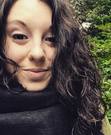Stephanie M. Wytovich's Blog, page 28
June 24, 2013
WYTOVICH MEETS WINTON IN MADHOUSE
PATIENT: BYRON WINTONILLNESS: ARTIST When did you start creating? Oh geez... a long time ago, in a trailer far, far, away. I drew as a kid; monsters, hot rods, band logos, etc. It wasn't until I exhausted all of what my school had to offer for drafting/architecture that I took my first 'real' art class. 9th grade, I believe. Why did you pick the genre/style you work in? It's the physical manifestation of my Id. My head is filled with nonsense... a crock-pot of all the shit I immerse myself and expose myself to. It's a weird perpetual taffy making device. Fantasy and horror is such an escapism from the mundane life I live; it's very routine and safe. So when I paint, I get to freak out in way... get scary! Did you go to school for it?
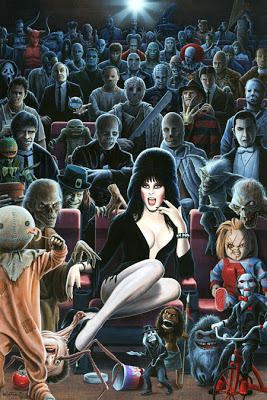
Yeah, sort of. I shouldn't be able to count going to the Art Institute of Pittsburgh with its reputable... um, infamous reputation. Thankfully, I graduated years ago... back in '93. It all started when one of their reps came to my high school senior year. I was a precocious youth; I was in the art room 6 periods of the day. I was often used by the teacher as an example to the other students... mostly of what not to do...it was my love of the 6 hair brush and horror subject matter. I was exposed to many mediums, but painting was what I settled on. I had aspirations of going to Pratt or Parsons in NYC, but those were scary and very expensive options. AIP swooped in at just the right time; my vulnerable and naïve self was putty in their hands. During my days at AIP, I learned how to apply my budding painting abilities, how to do typography, and how the new technology was going to negate my education at this trade school. Enter the age of computers! In the end, I'm really a self taught painter. Every now and then though, I do take advice and pick-up tips from fellow painters who, I think, are far more skilled than I am. Where do you get your ideas from? My mom tells me what to paint. Hahahahaha. I used that line recently at a convention. I get my ideas from where most creators get theirs, out of thin air, right? Sure, there's some from dreams, or seeing something striking, or word association. I'm always thinking of stuff, percolating, and evolving ideas. At any given moment I can give you ten ideas that are on my mind. It makes me a bit scatter brained at times. Do you journal, sketch, photograph at all to start? Absolutely! I got a stack of sketchbooks filled full of failed (mostly) drawings and thoughts. Some ideas warrant more drawings than others. And if the idea needs photo reference to help aid in a stronger painting, I'll take one... or a hundred.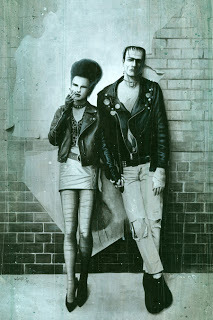 What’s a normal designing day like for you? An unhealthy dose of procrastination. Then, a period of contemplation and scrutiny. After all that, it's time to work! Some days, one phase takes more precedence over the other. Currently, I reluctantly share my day with a demanding day job. That means if that doesn't wipe me out completely, I just might be able to attempt my 3-step process. Do you tend to get more done at one time versus another? Nights and weekends. Especially when I should be sleeping. Oh, and also when I'm in a healthy relationship. I like a good muse. Not necessary for their angelic beauty, but mostly for their support and a peace of mind they give me; soothing the savage beast. Favorite artist or designer? Many, many, many! I love talent... style, flare, attitude! Drew Struzan, Michael Whelan, Alphonse Mucha, Simon Bisley, Travis Charest, Gustave Doré, Jae Lee, Dave Dorman, Tyler Stout, Tim Vigil, Geoff Darrow, Jason Edmiston, Pushead, Brom, Mike Mignola. Who are you currently following? Other than the artists listed above, I love movies! All types. Mostly films by; John Carpenter, Terry Gilliam, David Fincher, Tim Burton, and Ridley Scott. Books! Reading books are another compelling media I enjoy; Max Brooks, William Gibson, Bret Easton Ellis, Chuck Palahniuk, Stephen King, Clive Barker, Bradbury, Vonnegut, Lovecraft, and Neil Gaiman. Do you prefer working in one medium over another? Indeed! Acrylics! It's been my medium of choice ever since I received a $50 scholarship from the Golden Acrylics Co. for HS graduation. Funny enough, this prestigious brand of acrylics has its factory in the next town over from where I lived. A $50 scholarship was doubled when you shop in the factory. I was set for a few years! Back then, you couldn't find their paint except for a select few retailers and mail order. Nowadays, you can find their paint in just about every art and craft store. Do you work in silence or with noise?
What’s a normal designing day like for you? An unhealthy dose of procrastination. Then, a period of contemplation and scrutiny. After all that, it's time to work! Some days, one phase takes more precedence over the other. Currently, I reluctantly share my day with a demanding day job. That means if that doesn't wipe me out completely, I just might be able to attempt my 3-step process. Do you tend to get more done at one time versus another? Nights and weekends. Especially when I should be sleeping. Oh, and also when I'm in a healthy relationship. I like a good muse. Not necessary for their angelic beauty, but mostly for their support and a peace of mind they give me; soothing the savage beast. Favorite artist or designer? Many, many, many! I love talent... style, flare, attitude! Drew Struzan, Michael Whelan, Alphonse Mucha, Simon Bisley, Travis Charest, Gustave Doré, Jae Lee, Dave Dorman, Tyler Stout, Tim Vigil, Geoff Darrow, Jason Edmiston, Pushead, Brom, Mike Mignola. Who are you currently following? Other than the artists listed above, I love movies! All types. Mostly films by; John Carpenter, Terry Gilliam, David Fincher, Tim Burton, and Ridley Scott. Books! Reading books are another compelling media I enjoy; Max Brooks, William Gibson, Bret Easton Ellis, Chuck Palahniuk, Stephen King, Clive Barker, Bradbury, Vonnegut, Lovecraft, and Neil Gaiman. Do you prefer working in one medium over another? Indeed! Acrylics! It's been my medium of choice ever since I received a $50 scholarship from the Golden Acrylics Co. for HS graduation. Funny enough, this prestigious brand of acrylics has its factory in the next town over from where I lived. A $50 scholarship was doubled when you shop in the factory. I was set for a few years! Back then, you couldn't find their paint except for a select few retailers and mail order. Nowadays, you can find their paint in just about every art and craft store. Do you work in silence or with noise?
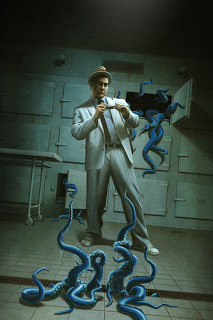
Noise, for sure! My music library is set on random play... I don't let the music dictate my mood when I create like most artists do. There's a hefty amount of Industrial, Hair band Metal, Alternative, New Wave, Soundtracks, and Instrumental. I'll skip a track or two if it severely derails my mojo. That power is in my control!!! Do you have any weird habits when it comes to working on your art? Pantless! Don't look at me like that. Nobody's home. I'll dress... undress how I see fit! What do you think is the hardest aspect of the craft? For me... quality. I have a few friends that I have to get their input from. Sometimes, great ideas and executions don't play out as I planed. I spend a lot of time on a painting, so it's nice to have a few extra set of eyes have a look-see... course correct me, in a sense. Can't see the forest for the trees, the saying goes. My friends can't be all, "yeah, looks good" either. They need to be critical... positive or negative. Current projects? I've spent the first 6 months of this year on commissions. 3 book covers and 2 album covers. All to be soon released sometime later this year, I hope. I've had no time to work on personal projects. I have a list that are demanding my time as soon as my last gig is up. Prior to this year, I've had only a couple commissions a year. It was last year's Creature Feature painting that attracted some new clients. I guess I can't complain too much about paying projects and the exposure they'll offer. How do you balance work with art? First of all, art shouldn't feel like work. Do it because it's fun. Zen, almost. It really is! It's when you start to apply structure and reward that it turns into work. Secondly, it's work (the day job) that fuels me to be a better and successful artist... shoot for the stars. I'd love to do my art full-time, but I often wonder if I'll have the motivation to continue to escape orbit. That drive won't be there. Perhaps my humble aspirations will be replaced by a growing ego. I don't know, I hope not. We'll see. I'm sure some other catalyst will present itself.
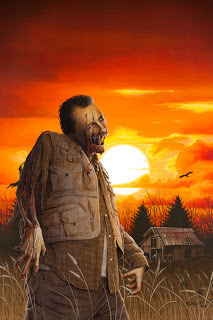 What do you think people expect from you with your art? For clients... meeting deadlines and a satisfaction of knowing they hired the right guy for their project. For my personal projects, I do them for myself. Some pieces speak more clearly to people than others. I experience this at conventions all the time. Some of my earlier painting were completely ignored. It happens. Not every painting is going to be a masterpiece. Advice for aspiring artists or designers? Take off the blinders. Allow the world to influence you. Be your own person. Question everything. Draw like there's no tomorrow. Don't take my job or make it obsolete!
What do you think people expect from you with your art? For clients... meeting deadlines and a satisfaction of knowing they hired the right guy for their project. For my personal projects, I do them for myself. Some pieces speak more clearly to people than others. I experience this at conventions all the time. Some of my earlier painting were completely ignored. It happens. Not every painting is going to be a masterpiece. Advice for aspiring artists or designers? Take off the blinders. Allow the world to influence you. Be your own person. Question everything. Draw like there's no tomorrow. Don't take my job or make it obsolete!
UPCOMING APPEARANCES: Steel City Con (Pittsburgh) July 26-28Horror Hound (Indianapolis) September 6-8Illuxcon (Allentown) September 14Horror Realm (Pittsburgh) September 20-22
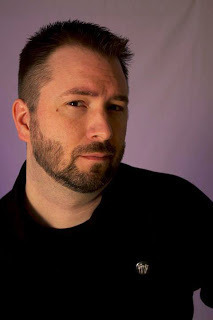 LINKS:Email: bwinton3@gmail.comWebsite: www.byronwinton.comFacebook: www.facebook.com/byron.wintonBlogger: byronwinton.blogspot.comDeviantArt: byronwinton.deviantart.com BIO: Byron, a Pittsburgh PA native, is a dedicated freelance fantasy and horror illustrator who has worked alongside the comic book industry over the years. His amazingly detail-rich paintings offer a little something for everyone. He paints popular culture imagery from memorable movies like; Star Wars, Resident Evil, and Beetlejuice to name a few, as well as mind-blowing original concepts. He has worked for CALIBER COMICS, the industrial band REIN[FORCED], and authors HEIDI RUBY MILLER and SUSAN K. DRONEY. In 2013, Byron will have works released by MOONSTONE BOOKS and POST MORTEM PRESS.
LINKS:Email: bwinton3@gmail.comWebsite: www.byronwinton.comFacebook: www.facebook.com/byron.wintonBlogger: byronwinton.blogspot.comDeviantArt: byronwinton.deviantart.com BIO: Byron, a Pittsburgh PA native, is a dedicated freelance fantasy and horror illustrator who has worked alongside the comic book industry over the years. His amazingly detail-rich paintings offer a little something for everyone. He paints popular culture imagery from memorable movies like; Star Wars, Resident Evil, and Beetlejuice to name a few, as well as mind-blowing original concepts. He has worked for CALIBER COMICS, the industrial band REIN[FORCED], and authors HEIDI RUBY MILLER and SUSAN K. DRONEY. In 2013, Byron will have works released by MOONSTONE BOOKS and POST MORTEM PRESS.

Yeah, sort of. I shouldn't be able to count going to the Art Institute of Pittsburgh with its reputable... um, infamous reputation. Thankfully, I graduated years ago... back in '93. It all started when one of their reps came to my high school senior year. I was a precocious youth; I was in the art room 6 periods of the day. I was often used by the teacher as an example to the other students... mostly of what not to do...it was my love of the 6 hair brush and horror subject matter. I was exposed to many mediums, but painting was what I settled on. I had aspirations of going to Pratt or Parsons in NYC, but those were scary and very expensive options. AIP swooped in at just the right time; my vulnerable and naïve self was putty in their hands. During my days at AIP, I learned how to apply my budding painting abilities, how to do typography, and how the new technology was going to negate my education at this trade school. Enter the age of computers! In the end, I'm really a self taught painter. Every now and then though, I do take advice and pick-up tips from fellow painters who, I think, are far more skilled than I am. Where do you get your ideas from? My mom tells me what to paint. Hahahahaha. I used that line recently at a convention. I get my ideas from where most creators get theirs, out of thin air, right? Sure, there's some from dreams, or seeing something striking, or word association. I'm always thinking of stuff, percolating, and evolving ideas. At any given moment I can give you ten ideas that are on my mind. It makes me a bit scatter brained at times. Do you journal, sketch, photograph at all to start? Absolutely! I got a stack of sketchbooks filled full of failed (mostly) drawings and thoughts. Some ideas warrant more drawings than others. And if the idea needs photo reference to help aid in a stronger painting, I'll take one... or a hundred.
 What’s a normal designing day like for you? An unhealthy dose of procrastination. Then, a period of contemplation and scrutiny. After all that, it's time to work! Some days, one phase takes more precedence over the other. Currently, I reluctantly share my day with a demanding day job. That means if that doesn't wipe me out completely, I just might be able to attempt my 3-step process. Do you tend to get more done at one time versus another? Nights and weekends. Especially when I should be sleeping. Oh, and also when I'm in a healthy relationship. I like a good muse. Not necessary for their angelic beauty, but mostly for their support and a peace of mind they give me; soothing the savage beast. Favorite artist or designer? Many, many, many! I love talent... style, flare, attitude! Drew Struzan, Michael Whelan, Alphonse Mucha, Simon Bisley, Travis Charest, Gustave Doré, Jae Lee, Dave Dorman, Tyler Stout, Tim Vigil, Geoff Darrow, Jason Edmiston, Pushead, Brom, Mike Mignola. Who are you currently following? Other than the artists listed above, I love movies! All types. Mostly films by; John Carpenter, Terry Gilliam, David Fincher, Tim Burton, and Ridley Scott. Books! Reading books are another compelling media I enjoy; Max Brooks, William Gibson, Bret Easton Ellis, Chuck Palahniuk, Stephen King, Clive Barker, Bradbury, Vonnegut, Lovecraft, and Neil Gaiman. Do you prefer working in one medium over another? Indeed! Acrylics! It's been my medium of choice ever since I received a $50 scholarship from the Golden Acrylics Co. for HS graduation. Funny enough, this prestigious brand of acrylics has its factory in the next town over from where I lived. A $50 scholarship was doubled when you shop in the factory. I was set for a few years! Back then, you couldn't find their paint except for a select few retailers and mail order. Nowadays, you can find their paint in just about every art and craft store. Do you work in silence or with noise?
What’s a normal designing day like for you? An unhealthy dose of procrastination. Then, a period of contemplation and scrutiny. After all that, it's time to work! Some days, one phase takes more precedence over the other. Currently, I reluctantly share my day with a demanding day job. That means if that doesn't wipe me out completely, I just might be able to attempt my 3-step process. Do you tend to get more done at one time versus another? Nights and weekends. Especially when I should be sleeping. Oh, and also when I'm in a healthy relationship. I like a good muse. Not necessary for their angelic beauty, but mostly for their support and a peace of mind they give me; soothing the savage beast. Favorite artist or designer? Many, many, many! I love talent... style, flare, attitude! Drew Struzan, Michael Whelan, Alphonse Mucha, Simon Bisley, Travis Charest, Gustave Doré, Jae Lee, Dave Dorman, Tyler Stout, Tim Vigil, Geoff Darrow, Jason Edmiston, Pushead, Brom, Mike Mignola. Who are you currently following? Other than the artists listed above, I love movies! All types. Mostly films by; John Carpenter, Terry Gilliam, David Fincher, Tim Burton, and Ridley Scott. Books! Reading books are another compelling media I enjoy; Max Brooks, William Gibson, Bret Easton Ellis, Chuck Palahniuk, Stephen King, Clive Barker, Bradbury, Vonnegut, Lovecraft, and Neil Gaiman. Do you prefer working in one medium over another? Indeed! Acrylics! It's been my medium of choice ever since I received a $50 scholarship from the Golden Acrylics Co. for HS graduation. Funny enough, this prestigious brand of acrylics has its factory in the next town over from where I lived. A $50 scholarship was doubled when you shop in the factory. I was set for a few years! Back then, you couldn't find their paint except for a select few retailers and mail order. Nowadays, you can find their paint in just about every art and craft store. Do you work in silence or with noise?

Noise, for sure! My music library is set on random play... I don't let the music dictate my mood when I create like most artists do. There's a hefty amount of Industrial, Hair band Metal, Alternative, New Wave, Soundtracks, and Instrumental. I'll skip a track or two if it severely derails my mojo. That power is in my control!!! Do you have any weird habits when it comes to working on your art? Pantless! Don't look at me like that. Nobody's home. I'll dress... undress how I see fit! What do you think is the hardest aspect of the craft? For me... quality. I have a few friends that I have to get their input from. Sometimes, great ideas and executions don't play out as I planed. I spend a lot of time on a painting, so it's nice to have a few extra set of eyes have a look-see... course correct me, in a sense. Can't see the forest for the trees, the saying goes. My friends can't be all, "yeah, looks good" either. They need to be critical... positive or negative. Current projects? I've spent the first 6 months of this year on commissions. 3 book covers and 2 album covers. All to be soon released sometime later this year, I hope. I've had no time to work on personal projects. I have a list that are demanding my time as soon as my last gig is up. Prior to this year, I've had only a couple commissions a year. It was last year's Creature Feature painting that attracted some new clients. I guess I can't complain too much about paying projects and the exposure they'll offer. How do you balance work with art? First of all, art shouldn't feel like work. Do it because it's fun. Zen, almost. It really is! It's when you start to apply structure and reward that it turns into work. Secondly, it's work (the day job) that fuels me to be a better and successful artist... shoot for the stars. I'd love to do my art full-time, but I often wonder if I'll have the motivation to continue to escape orbit. That drive won't be there. Perhaps my humble aspirations will be replaced by a growing ego. I don't know, I hope not. We'll see. I'm sure some other catalyst will present itself.
 What do you think people expect from you with your art? For clients... meeting deadlines and a satisfaction of knowing they hired the right guy for their project. For my personal projects, I do them for myself. Some pieces speak more clearly to people than others. I experience this at conventions all the time. Some of my earlier painting were completely ignored. It happens. Not every painting is going to be a masterpiece. Advice for aspiring artists or designers? Take off the blinders. Allow the world to influence you. Be your own person. Question everything. Draw like there's no tomorrow. Don't take my job or make it obsolete!
What do you think people expect from you with your art? For clients... meeting deadlines and a satisfaction of knowing they hired the right guy for their project. For my personal projects, I do them for myself. Some pieces speak more clearly to people than others. I experience this at conventions all the time. Some of my earlier painting were completely ignored. It happens. Not every painting is going to be a masterpiece. Advice for aspiring artists or designers? Take off the blinders. Allow the world to influence you. Be your own person. Question everything. Draw like there's no tomorrow. Don't take my job or make it obsolete!UPCOMING APPEARANCES: Steel City Con (Pittsburgh) July 26-28Horror Hound (Indianapolis) September 6-8Illuxcon (Allentown) September 14Horror Realm (Pittsburgh) September 20-22
 LINKS:Email: bwinton3@gmail.comWebsite: www.byronwinton.comFacebook: www.facebook.com/byron.wintonBlogger: byronwinton.blogspot.comDeviantArt: byronwinton.deviantart.com BIO: Byron, a Pittsburgh PA native, is a dedicated freelance fantasy and horror illustrator who has worked alongside the comic book industry over the years. His amazingly detail-rich paintings offer a little something for everyone. He paints popular culture imagery from memorable movies like; Star Wars, Resident Evil, and Beetlejuice to name a few, as well as mind-blowing original concepts. He has worked for CALIBER COMICS, the industrial band REIN[FORCED], and authors HEIDI RUBY MILLER and SUSAN K. DRONEY. In 2013, Byron will have works released by MOONSTONE BOOKS and POST MORTEM PRESS.
LINKS:Email: bwinton3@gmail.comWebsite: www.byronwinton.comFacebook: www.facebook.com/byron.wintonBlogger: byronwinton.blogspot.comDeviantArt: byronwinton.deviantart.com BIO: Byron, a Pittsburgh PA native, is a dedicated freelance fantasy and horror illustrator who has worked alongside the comic book industry over the years. His amazingly detail-rich paintings offer a little something for everyone. He paints popular culture imagery from memorable movies like; Star Wars, Resident Evil, and Beetlejuice to name a few, as well as mind-blowing original concepts. He has worked for CALIBER COMICS, the industrial band REIN[FORCED], and authors HEIDI RUBY MILLER and SUSAN K. DRONEY. In 2013, Byron will have works released by MOONSTONE BOOKS and POST MORTEM PRESS.
Published on June 24, 2013 22:55
June 18, 2013
WYTOVICH DISCOVERS THAT NEW ORLEANS IS THE MADHOUSE
Patient: Stephanie M. Wytovich
Treatment: World Horror Convention 2013
Voodoo, Vampires, and Bourbon Street.
New Orleans was quite the experience.
It was my first time in the city, and to say that it was my last would be a lie. I fully intend to visit again, if not for the history, but for the air. New Orleans is definitely thick with inspiration. And jazz, which I love. If there is one aspect of life that speaks more to me than writing, it's music, and in New Orleans, that's never in short supply.
So I danced, I drank (highly recommend the Hemingway Daiquiris) and I met wonderful new people that have enriched my life in more ways than one. I listened to vampire stories, watched a Voodoo ritual performed right in front of my face, ate fried oysters and shared conversations and experiences with old friends that I won't soon be able to forget. I fell in love with a dress shop (Trashy Diva) and I'll probably have to sell a kidney or two to pay for my purchases there, but sometimes dresses happen, and sometimes a girl just has to say yes to them. You only live once after all. Might as well be stylish.
I think I learned more on this trip than any other that I've ever been on, and not just about writing. About life. Turns out my friends are insanely wise, and just when I think I have something figured out, life throws me a curveball, and I'm back in the madhouse. Which is good, because let's face it. That's where I belong! And that's why I'm a writer.
So I talked poetry, I drank some more, and I asked questions about the business. I sat along the Mississippi River, laughed a lot in a dungeon, rode in a street car for the first time, and then almost missed my flight back home because I was reading a book and lost track of time. I barely slept, consumed coffee to a (probably) lethal degree, got a GIANT bruise after scaling a wall to take a picture, and left with a wonderful collection of signed novels.
I'm learning that the key--another drink that I'd recommend, by the way--to being a writer is actually quite simple. Sure you have to write, and read, and submit, but you also have to live. You have to travel, and meet people, and have conversations, and dammit, you have to live. Because then when you tell a story, you'll glow. Not literally (unless you've had one too many hand grenades) but you'll shine, baby. And that is what writing is about. Emotion.
So play with Voodoo, and hang out with vampires.
Listen to too much jazz, and spend too much money on stuff you'll probably never use.
Go to panels and ask questions.
Talk to people that you admire, and tell them why you admire them.
Just promise me... you'll live.
Stay Scared,
Stephanie M. Wytovich
Treatment: World Horror Convention 2013
Voodoo, Vampires, and Bourbon Street.
New Orleans was quite the experience.
It was my first time in the city, and to say that it was my last would be a lie. I fully intend to visit again, if not for the history, but for the air. New Orleans is definitely thick with inspiration. And jazz, which I love. If there is one aspect of life that speaks more to me than writing, it's music, and in New Orleans, that's never in short supply.
So I danced, I drank (highly recommend the Hemingway Daiquiris) and I met wonderful new people that have enriched my life in more ways than one. I listened to vampire stories, watched a Voodoo ritual performed right in front of my face, ate fried oysters and shared conversations and experiences with old friends that I won't soon be able to forget. I fell in love with a dress shop (Trashy Diva) and I'll probably have to sell a kidney or two to pay for my purchases there, but sometimes dresses happen, and sometimes a girl just has to say yes to them. You only live once after all. Might as well be stylish.
I think I learned more on this trip than any other that I've ever been on, and not just about writing. About life. Turns out my friends are insanely wise, and just when I think I have something figured out, life throws me a curveball, and I'm back in the madhouse. Which is good, because let's face it. That's where I belong! And that's why I'm a writer.
So I talked poetry, I drank some more, and I asked questions about the business. I sat along the Mississippi River, laughed a lot in a dungeon, rode in a street car for the first time, and then almost missed my flight back home because I was reading a book and lost track of time. I barely slept, consumed coffee to a (probably) lethal degree, got a GIANT bruise after scaling a wall to take a picture, and left with a wonderful collection of signed novels.
I'm learning that the key--another drink that I'd recommend, by the way--to being a writer is actually quite simple. Sure you have to write, and read, and submit, but you also have to live. You have to travel, and meet people, and have conversations, and dammit, you have to live. Because then when you tell a story, you'll glow. Not literally (unless you've had one too many hand grenades) but you'll shine, baby. And that is what writing is about. Emotion.
So play with Voodoo, and hang out with vampires.
Listen to too much jazz, and spend too much money on stuff you'll probably never use.
Go to panels and ask questions.
Talk to people that you admire, and tell them why you admire them.
Just promise me... you'll live.
Stay Scared,
Stephanie M. Wytovich
Published on June 18, 2013 17:00
June 10, 2013
WYTOVICH CLAIMS ANOTHER VICTIM IN MADHOUSE
PATIENT: C. BRYAN BROWN
ILLNESS: WRITER
When did you start writing? Why did you pick the genre you write it?
I got my official start when I was 13 or 14 (maybe 15?). NKoTB were young and huge. Am I giving away my age here? At any rate, my sister was a big fan (admittedly, I didn’t hate them) and when I say big fan, take that to mean she’d chew their day-old Bubble Yum if given half a chance. She pissed me off one day and so I killed them. All of them. In gruesome, disgusting ways via werewolves, zombies, vampires, bombs, witches, and whatever; I don’t remember all the details, other than it took so and so many spiral notebooks, each page painstakingly handwritten, front and back. So yeah, for you n00bs out there, this is waaaaaaaaay back before computers were iMpersonal and in the palm of your hand. This was back before computers were even really a thing in most homes. I don’t think we got our first computer for another couple of years and it was tucked away in the master bedroom. Where my parents slept.
And did other things.
I kind of stayed away from the machine at first, not because the thought of my parents screwing bothered me (I knew where I came from... wait, was that a bad pun?) but rather I just didn’t get along with them at the time and so stayed as far as away as possible.
I chose the speculative fiction genre because it’s what I grew up reading and watching and loving. All manner of spec fic ranging from King, McCammon, Wilson, Bradbury, Koontz, to Orwell, Twain, Chesbro, Matheson, anything D&D related, and Crichton. I watched a bevy of horror movies; my mother pulled me out of bed when I was 11 to watch the original Nightmare on Elm Street movie with her. She was scared and I suppose having an eleven-year-old, someone who couldn’t punch himself out of a bag at the time, made her feel safe. Personally, I just think she woke me up in case Freddy tried dragging her across the ceiling, she could offer me up instead. I’m also a giant fan of Disney cartoons and watched many, many growing up. And sure, a lot of them are mostly anthropomorphic, but there’s also quite a few fairy tales/magic realism thrown in for good measure.
So there’s all that and the small matter of loving to show the ordinary through the extraordinary. It’s like exaggerating your point, but not really, and people seem to get said point a lot quicker.
For example, I can write a human monster and people might call him an anti-hero, but if I write a human who turns into a werewolf, who’s also an asshole but does the same things as the regular human, the werewolf isn’t as redeemable. He’s suddenly a monster in all senses of the word.
Where you get your ideas from? Do you journal at all? I’m like an open trash bin where stuff keeps getting jammed in. In other words, my ideas come from everything and everywhere. I don’t limit myself nor do I want to. I’ve taken ideas from song lyrics, pictures, the news, things my kids have said, my job, my personal experiences... really, the list is endless.
I do not journal, but I blog. Half-assedly. I enjoy the blogging and throwing out opinions, thoughts, lies, what have you, but my time is better utilized writing fiction than interacting with the four people who visit my blog/website on a weekly basis. And considering three of them are family, I can always text; it’s quicker.
What’s a normal (writing) day like for you?
A normal writing day consists of waking up at around 4:30 am with coffee and then going to my corporate job for 10 hours, where I’m browbeaten, underappreciated, though not underpaid. After that, it’s quasi-family time. Homework with the kids, dinner, various (and sometimes necessary) other activities like shopping or school functions. I might also read, play video games, or take a nap if I can get away with it. Once the kids go to bed, which is around 8:30, I put my butt in a chair, drag out the laptop, and I’ll either write or edit until I can’t see straight anymore. Sometimes that’s as early at 10:30, sometimes it’s around midnight. As a matter of fact, it’s around 9 as I type this.
Favorite author or book? Who are you currently reading?
SO HARD! But if I have to choose just one, it’s Stephen King. Like him, love him, or hate him, it doesn’t matter. The man is scary smart when it comes to crafting poignant stories and relatable characters. Truth be told, I haven’t read much of his work after Gerald’s Game. I couldn’t get through that book (it came out when I was a senior in high school and that’s when I last tried to read it), but it doesn’t diminish the affection I have for some of his earlier works. I have read The Cell and Bag of Bones, a couple of his short story collections.
My favorite book, which I’m mentioning separately, as it’s not a Stephen King book, is Beasts of Valhalla by George Chesbro. It’s the fourth book in the Mongo Mystery series and it’s just a roller coaster ride of science fiction, horror, mystery, thriller, and humor. Just a great, great book. A close second, a book I read every year along with Beasts, is They Thirst by Robert McCammon.
I’m currently reading more books than I have hands. They are, in no particular order: The Hunt by Joseph Williams, The Talisman by King& Straub, and Let the Right One In by John Ajvide Lindqvist.
Do you prefer writing poetry or prose? Why one over the other?
I prefer prose. When I was younger, poetry always seemed somewhat pretentious. The people in high school who wrote poetry were cliquish, very haute couture, if you will. If you didn’t fit their mold, you weren’t taking seriously. It’s not a fair assessment of poetry itself, basing it on the poets I knew growing up, and I have a much fonder appreciation for the form, but my earlier resentment still exists.
Do you write in silence or with noise (TV, movies, music)?
I write in silence brought on by white noise in the form of music. The music tends to be bands I’m very familiar with (Metallica, KISS, Van Halen, Van Hagar) so that it’s tuned right on out of my brain. I know the lyrics, the music, so I’m not concentrating on it, or singing along, things like that. It’s comfortable and non-distracting, but it drowns out all the excess noise around me. I don’t hear if the kids are getting up out of bed, or if someone’s knocking at the door. I usually can’t even hear my phone ringing right next to me. I can’t write with the television on, simply because if I’m watching television, it’s something I want to see and I’ll pay attention.
Do you have any weird habits when it comes to writing? Do you type or write longhand?
No, I’m a vanilla-writing-habit kind of writer... okay, so that was convoluted, so I’ll just say no, I have no weird habits. I sit down, put my headphones in, and type. I outline like a fiend, which I get into more with the next question, but that’s about it. I write longhand if I’m having trouble pushing forward or starting a story (a few pages, maybe a dozen at the most), but I’ll eventually switch back to the computer.
There’s something about writing longhand that frees my mind, lets me write without reservation and get past those parts I struggle with. Hazarding a guess and psychoanalyzing myself, I’d say it’s because writing on paper is sloppy as hell (handwritten, eraser marks, scratch outs, all junking up the prose) and in my head, I know it’s okay to just write down whatever I want in that mess, which is in direct contrast to the white, pristine pages of Microsuck Word. Sometimes, I just need to know it’s perfectly acceptable to shovel shit from a sitting position (thank you for that quote, Mr. King!) Hopefully, that makes sense. It’s a free diagnosis, so if it doesn’t, fuck it, right?
Would you consider yourself a Plotter or a Pancer?
It depends on the length. I’m an “over” plotter when it comes to my novels. My outlines run in the double digits page wise. I have scene outlines, dialogue outlines, character outlines. I draw maps, timelines; I go all out.
Short fiction is usually pantsed, based on a thought, an image, or a scrap of dialogue between characters. I just run with it and build around that central piece.
What do you think is the hardest aspect of the craft?
The hardest part is writing that first draft, which is really a matter of turning off the “inner editor” and just writing. Most everything else can be fixed in revision and editing, but if you don’t get to that stage, the game is over.
Beyond that, not letting the characters dictate the entire story. They have a tendency to run away with the narrative and while I grant them some creative license, there comes a time to rein them in and be the parental unit.
Current projects?
There’s a few current projects. Let me count them off...
I have two planned trilogies in the works. I’m currently ass-deep in the first book of both. One is about halfway through the first draft and the other is halfway through the revision process. One deals with a vampire apocalypse and the other isn’t fully formed just yet, so I won’t comment.
Along with those two novel sets, I’m revising a YA fantasy novel of about 75k words.
Then there are the short stories, which I’ve woefully neglected the last few months. There are a handful in various stages of completion, including two that have just titles and themes.
How do you balance being an editor and being a writer?
I’m not really sure it’s a balancing thing at all; it’s a commitment that I’ve made, not much different from getting married or agreeing to have kids (and then having a couple). Writing is a part of my life and it doesn’t get shucked any more or any less than any other part of it.
Like I answered in the “normal writing day” question, I have a time I’ve set aside to write (or do writing related activities, such as this interview). There’s very little that messes with that particular writing time.
On the weekends, I’ll miss going to the zoo with my kids in favor of attending a convention, such as Context in Columbus, Ohio. I go to a writing group every other Saturday and I skip going to my local Farmer’s Market (best organic cheese ever) on those days, or seeing my kids play at the park, or my son and daughter-in-law visiting. I tell my kids I’m working and they accept that. At the same time, if my wife has a cake to deliver (she does cakes and cupcakes, etc), I’ll skip writing and help her. So if something important comes up, I don’t write. I missed a writing group meeting in early May to attend my stepson’s college graduation. Both my kids were born in November, which is NaNoWriMo month for some novelists out there. I use NaNo as an excuse to leave the house nearly every day and write, except for those birthdays. Instead, I’m at the parties, smiling, having a blast and not worrying about word count.
When I sit down at the laptop, my toddler asks me, “Daddy, are you working?” I’ve ingrained writing into my life and the people around me know that.
It’s my opinion that if you have to balance your life to make time for your writing, you’re not as devoted as you could be. And I hope no one takes that as a “fuck you” because it’s not intended that way. Each person has to decide how important writing is to him or her and that’s on the individual. No judgment, but in my world, either you write or you don’t.
What do you think people expect from you with your writing? EX: Can they always count on a good gross out?
I hope that they expect a well-crafted, entertaining read that makes them think about some aspect of the world we live in. Other than that, I hope they never know what to expect. I want to continually redefine myself as a writer, be prolific in regards to genre and style, and appeal to a wide range of people. Or everyone, you know.
The only odd thing I’ve noticed (as have a few others who’ve read even my unpublished work) is that my short stories lean much more toward horror while my novels are much more urban fantasy-ish.
Advice for aspiring writers?
It’s cliché, I’m sure, to hear something so similar to things every writer says, but the best advice I’ve received: read critically and write desperately.
Reading and writing (language, in general) is something we’re all taught in school, and like any skill you possess, practice makes you better. It’s a lot harder to learn how to draw because it’s not something you must be able to do in order to survive, but you need to be able to read and write to do just about everything life throws at you. So read everything critically—tear it apart, look for the underlying themes and messages, the word choices—and each time you write, do so desperately, as if it’s the last thing you’ll ever get to do. Treat what you’re putting on that paper as the most important thing you’ve ever had to say in this life.
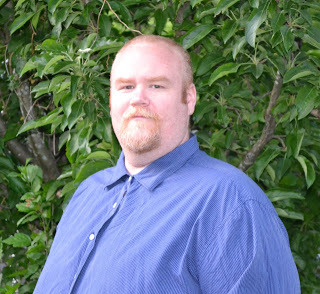 Bio: C. Bryan Brown was born and raised in St. Louis, Missouri and the surrounding counties in a middle class family by mostly loving parents (regardless of the famed “Plunger” incident at the age of 17). He no longer lives in Missouri, is married with children, and isn't looking forward to dying. You can find him all over the interwebz, but he questions anyone who does.
Bio: C. Bryan Brown was born and raised in St. Louis, Missouri and the surrounding counties in a middle class family by mostly loving parents (regardless of the famed “Plunger” incident at the age of 17). He no longer lives in Missouri, is married with children, and isn't looking forward to dying. You can find him all over the interwebz, but he questions anyone who does.
www.cbryanbrown.netwww.facebook.com/cbryanbrown@cbryanbrown
His first novel, Necromancer, was released last year by Post Mortem Press (www.postmortem-press.com). Most recently he's had short stories appear in the anthologies "Fear the Abyss" and "For When the Veil Drops," both of which are available via Amazon. In fact, you can find all his published work at his author page, located here: amazon.com/author/cbryanbrown
ILLNESS: WRITER
When did you start writing? Why did you pick the genre you write it?
I got my official start when I was 13 or 14 (maybe 15?). NKoTB were young and huge. Am I giving away my age here? At any rate, my sister was a big fan (admittedly, I didn’t hate them) and when I say big fan, take that to mean she’d chew their day-old Bubble Yum if given half a chance. She pissed me off one day and so I killed them. All of them. In gruesome, disgusting ways via werewolves, zombies, vampires, bombs, witches, and whatever; I don’t remember all the details, other than it took so and so many spiral notebooks, each page painstakingly handwritten, front and back. So yeah, for you n00bs out there, this is waaaaaaaaay back before computers were iMpersonal and in the palm of your hand. This was back before computers were even really a thing in most homes. I don’t think we got our first computer for another couple of years and it was tucked away in the master bedroom. Where my parents slept.
And did other things.
I kind of stayed away from the machine at first, not because the thought of my parents screwing bothered me (I knew where I came from... wait, was that a bad pun?) but rather I just didn’t get along with them at the time and so stayed as far as away as possible.
I chose the speculative fiction genre because it’s what I grew up reading and watching and loving. All manner of spec fic ranging from King, McCammon, Wilson, Bradbury, Koontz, to Orwell, Twain, Chesbro, Matheson, anything D&D related, and Crichton. I watched a bevy of horror movies; my mother pulled me out of bed when I was 11 to watch the original Nightmare on Elm Street movie with her. She was scared and I suppose having an eleven-year-old, someone who couldn’t punch himself out of a bag at the time, made her feel safe. Personally, I just think she woke me up in case Freddy tried dragging her across the ceiling, she could offer me up instead. I’m also a giant fan of Disney cartoons and watched many, many growing up. And sure, a lot of them are mostly anthropomorphic, but there’s also quite a few fairy tales/magic realism thrown in for good measure.
So there’s all that and the small matter of loving to show the ordinary through the extraordinary. It’s like exaggerating your point, but not really, and people seem to get said point a lot quicker.
For example, I can write a human monster and people might call him an anti-hero, but if I write a human who turns into a werewolf, who’s also an asshole but does the same things as the regular human, the werewolf isn’t as redeemable. He’s suddenly a monster in all senses of the word.
Where you get your ideas from? Do you journal at all? I’m like an open trash bin where stuff keeps getting jammed in. In other words, my ideas come from everything and everywhere. I don’t limit myself nor do I want to. I’ve taken ideas from song lyrics, pictures, the news, things my kids have said, my job, my personal experiences... really, the list is endless.
I do not journal, but I blog. Half-assedly. I enjoy the blogging and throwing out opinions, thoughts, lies, what have you, but my time is better utilized writing fiction than interacting with the four people who visit my blog/website on a weekly basis. And considering three of them are family, I can always text; it’s quicker.
What’s a normal (writing) day like for you?
A normal writing day consists of waking up at around 4:30 am with coffee and then going to my corporate job for 10 hours, where I’m browbeaten, underappreciated, though not underpaid. After that, it’s quasi-family time. Homework with the kids, dinner, various (and sometimes necessary) other activities like shopping or school functions. I might also read, play video games, or take a nap if I can get away with it. Once the kids go to bed, which is around 8:30, I put my butt in a chair, drag out the laptop, and I’ll either write or edit until I can’t see straight anymore. Sometimes that’s as early at 10:30, sometimes it’s around midnight. As a matter of fact, it’s around 9 as I type this.
Favorite author or book? Who are you currently reading?
SO HARD! But if I have to choose just one, it’s Stephen King. Like him, love him, or hate him, it doesn’t matter. The man is scary smart when it comes to crafting poignant stories and relatable characters. Truth be told, I haven’t read much of his work after Gerald’s Game. I couldn’t get through that book (it came out when I was a senior in high school and that’s when I last tried to read it), but it doesn’t diminish the affection I have for some of his earlier works. I have read The Cell and Bag of Bones, a couple of his short story collections.
My favorite book, which I’m mentioning separately, as it’s not a Stephen King book, is Beasts of Valhalla by George Chesbro. It’s the fourth book in the Mongo Mystery series and it’s just a roller coaster ride of science fiction, horror, mystery, thriller, and humor. Just a great, great book. A close second, a book I read every year along with Beasts, is They Thirst by Robert McCammon.
I’m currently reading more books than I have hands. They are, in no particular order: The Hunt by Joseph Williams, The Talisman by King& Straub, and Let the Right One In by John Ajvide Lindqvist.
Do you prefer writing poetry or prose? Why one over the other?
I prefer prose. When I was younger, poetry always seemed somewhat pretentious. The people in high school who wrote poetry were cliquish, very haute couture, if you will. If you didn’t fit their mold, you weren’t taking seriously. It’s not a fair assessment of poetry itself, basing it on the poets I knew growing up, and I have a much fonder appreciation for the form, but my earlier resentment still exists.
Do you write in silence or with noise (TV, movies, music)?
I write in silence brought on by white noise in the form of music. The music tends to be bands I’m very familiar with (Metallica, KISS, Van Halen, Van Hagar) so that it’s tuned right on out of my brain. I know the lyrics, the music, so I’m not concentrating on it, or singing along, things like that. It’s comfortable and non-distracting, but it drowns out all the excess noise around me. I don’t hear if the kids are getting up out of bed, or if someone’s knocking at the door. I usually can’t even hear my phone ringing right next to me. I can’t write with the television on, simply because if I’m watching television, it’s something I want to see and I’ll pay attention.
Do you have any weird habits when it comes to writing? Do you type or write longhand?
No, I’m a vanilla-writing-habit kind of writer... okay, so that was convoluted, so I’ll just say no, I have no weird habits. I sit down, put my headphones in, and type. I outline like a fiend, which I get into more with the next question, but that’s about it. I write longhand if I’m having trouble pushing forward or starting a story (a few pages, maybe a dozen at the most), but I’ll eventually switch back to the computer.
There’s something about writing longhand that frees my mind, lets me write without reservation and get past those parts I struggle with. Hazarding a guess and psychoanalyzing myself, I’d say it’s because writing on paper is sloppy as hell (handwritten, eraser marks, scratch outs, all junking up the prose) and in my head, I know it’s okay to just write down whatever I want in that mess, which is in direct contrast to the white, pristine pages of Microsuck Word. Sometimes, I just need to know it’s perfectly acceptable to shovel shit from a sitting position (thank you for that quote, Mr. King!) Hopefully, that makes sense. It’s a free diagnosis, so if it doesn’t, fuck it, right?
Would you consider yourself a Plotter or a Pancer?
It depends on the length. I’m an “over” plotter when it comes to my novels. My outlines run in the double digits page wise. I have scene outlines, dialogue outlines, character outlines. I draw maps, timelines; I go all out.
Short fiction is usually pantsed, based on a thought, an image, or a scrap of dialogue between characters. I just run with it and build around that central piece.
What do you think is the hardest aspect of the craft?
The hardest part is writing that first draft, which is really a matter of turning off the “inner editor” and just writing. Most everything else can be fixed in revision and editing, but if you don’t get to that stage, the game is over.
Beyond that, not letting the characters dictate the entire story. They have a tendency to run away with the narrative and while I grant them some creative license, there comes a time to rein them in and be the parental unit.
Current projects?
There’s a few current projects. Let me count them off...
I have two planned trilogies in the works. I’m currently ass-deep in the first book of both. One is about halfway through the first draft and the other is halfway through the revision process. One deals with a vampire apocalypse and the other isn’t fully formed just yet, so I won’t comment.
Along with those two novel sets, I’m revising a YA fantasy novel of about 75k words.
Then there are the short stories, which I’ve woefully neglected the last few months. There are a handful in various stages of completion, including two that have just titles and themes.
How do you balance being an editor and being a writer?
I’m not really sure it’s a balancing thing at all; it’s a commitment that I’ve made, not much different from getting married or agreeing to have kids (and then having a couple). Writing is a part of my life and it doesn’t get shucked any more or any less than any other part of it.
Like I answered in the “normal writing day” question, I have a time I’ve set aside to write (or do writing related activities, such as this interview). There’s very little that messes with that particular writing time.
On the weekends, I’ll miss going to the zoo with my kids in favor of attending a convention, such as Context in Columbus, Ohio. I go to a writing group every other Saturday and I skip going to my local Farmer’s Market (best organic cheese ever) on those days, or seeing my kids play at the park, or my son and daughter-in-law visiting. I tell my kids I’m working and they accept that. At the same time, if my wife has a cake to deliver (she does cakes and cupcakes, etc), I’ll skip writing and help her. So if something important comes up, I don’t write. I missed a writing group meeting in early May to attend my stepson’s college graduation. Both my kids were born in November, which is NaNoWriMo month for some novelists out there. I use NaNo as an excuse to leave the house nearly every day and write, except for those birthdays. Instead, I’m at the parties, smiling, having a blast and not worrying about word count.
When I sit down at the laptop, my toddler asks me, “Daddy, are you working?” I’ve ingrained writing into my life and the people around me know that.
It’s my opinion that if you have to balance your life to make time for your writing, you’re not as devoted as you could be. And I hope no one takes that as a “fuck you” because it’s not intended that way. Each person has to decide how important writing is to him or her and that’s on the individual. No judgment, but in my world, either you write or you don’t.
What do you think people expect from you with your writing? EX: Can they always count on a good gross out?
I hope that they expect a well-crafted, entertaining read that makes them think about some aspect of the world we live in. Other than that, I hope they never know what to expect. I want to continually redefine myself as a writer, be prolific in regards to genre and style, and appeal to a wide range of people. Or everyone, you know.
The only odd thing I’ve noticed (as have a few others who’ve read even my unpublished work) is that my short stories lean much more toward horror while my novels are much more urban fantasy-ish.
Advice for aspiring writers?
It’s cliché, I’m sure, to hear something so similar to things every writer says, but the best advice I’ve received: read critically and write desperately.
Reading and writing (language, in general) is something we’re all taught in school, and like any skill you possess, practice makes you better. It’s a lot harder to learn how to draw because it’s not something you must be able to do in order to survive, but you need to be able to read and write to do just about everything life throws at you. So read everything critically—tear it apart, look for the underlying themes and messages, the word choices—and each time you write, do so desperately, as if it’s the last thing you’ll ever get to do. Treat what you’re putting on that paper as the most important thing you’ve ever had to say in this life.
 Bio: C. Bryan Brown was born and raised in St. Louis, Missouri and the surrounding counties in a middle class family by mostly loving parents (regardless of the famed “Plunger” incident at the age of 17). He no longer lives in Missouri, is married with children, and isn't looking forward to dying. You can find him all over the interwebz, but he questions anyone who does.
Bio: C. Bryan Brown was born and raised in St. Louis, Missouri and the surrounding counties in a middle class family by mostly loving parents (regardless of the famed “Plunger” incident at the age of 17). He no longer lives in Missouri, is married with children, and isn't looking forward to dying. You can find him all over the interwebz, but he questions anyone who does.www.cbryanbrown.netwww.facebook.com/cbryanbrown@cbryanbrown
His first novel, Necromancer, was released last year by Post Mortem Press (www.postmortem-press.com). Most recently he's had short stories appear in the anthologies "Fear the Abyss" and "For When the Veil Drops," both of which are available via Amazon. In fact, you can find all his published work at his author page, located here: amazon.com/author/cbryanbrown
Published on June 10, 2013 16:35
June 4, 2013
WYTOVICH WITNESSES PRESTON'S REVELATIONS
THE REVELATIONS OF PRESTON BLACK BY JASON JACK MILLER
Coming June 2013 from Raw Dog Screaming Press
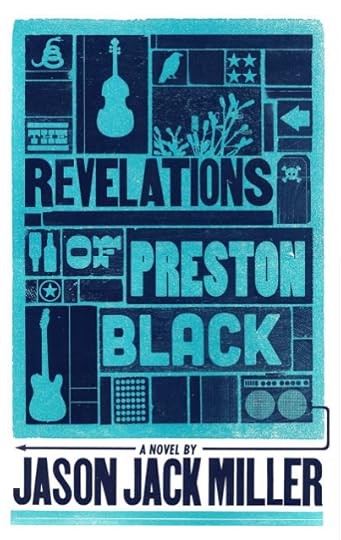
Preston and Katy face a new darkness....
Sometimes a battle between good and evil doesn't look much like the ones they show in movies. The good guys don't always wear white, and they don’t always walk away with the win.
And sometimes you're better off with the devil you know.
The last time Preston went down to the crossroads, his best friend died and he nearly lost his brother. But Old Scratch doesn't take kindly to fools, especially not those who come knocking at his front door. And before all is said and done, he's going to teach Preston a thing or two about what it really means to sacrifice.
Read the first 100 pages of The Revelations of Preston Black - http://jasonjackmiller.blogspot.com/p/the-revelations-of-preston-black.html
Pre-order The Revelations of Preston Black at Raw Dog Screaming Press - http://www.rawdogscreaming.com/books/the-revelations-of-preston-black.html
Brad Vetter - http://bradvetterdesign.comJason Jack Miller - http://jasonjackmiller.blogspot.comRaw Dog Screaming Press – http://www.rawdogscreaming.com
Published on June 04, 2013 18:55
June 2, 2013
WYTOVICH WELCOMES DOC HOLLIDAY INTO MADHOUSE
PATIENT: MADDIE HOLLIDAY VON STARK
ILLNESS: ARTIST, WRITER
When did you start creating? Why did you pick the genre/style you work it?
My Life's narrative is the force of motion in any creative project I tinker with. Some are more successful than others. Currently, I just finished my first novel, "The Widow's Game, Another Amazing Adventure of Maddie Holliday Von Stark, which is in second draft status with my very mysterious mentor and his team on the West Coast. As you know, I am a living breathing ghost of America's fine North. As for my current visual paintings of various shades of "creep," for The Wicked Library, the stories are my portraying inspire to them. Again, I am very much an artist driven my narratives.
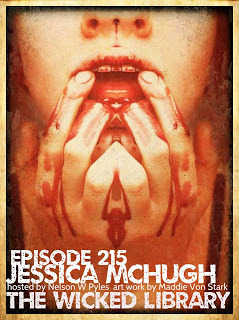 Did you go to school for it? If so, where and what did you study?
Did you go to school for it? If so, where and what did you study?I have a BFA in Graphic Design from Montana State University. Also, a BA in Graphic Art Education k-12. And one M.ed Communications Technology [degree] that was finished when I was really sick in the long aftermath of a tumor I had removed from under my brain...I am not sure I retained any of that book learning! I am probably, technically a bit off my marbles.
Where do you get your ideas from? Do you journal, sketch, photograph at all to start?
I replaced my sketchpad with an iPad years ago.
What's a normal designing day like for you? Do you tend to get more down at one time versus another?
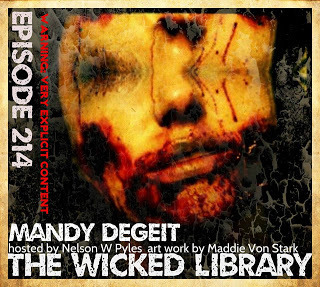 I have a day job as a web coder for a very large local business. I live in the world of time and deadlines. Which is frightening when you kill around twenty watches a year on average. This is not including computers, cell phones, and remote controls. I have a pocket watch which has yet to disappoint me.
I have a day job as a web coder for a very large local business. I live in the world of time and deadlines. Which is frightening when you kill around twenty watches a year on average. This is not including computers, cell phones, and remote controls. I have a pocket watch which has yet to disappoint me.Favorite artist or designer? Who are you currently following?
I follow and support the local INDY horror writers/artist community. We are badass. I hope one of us makes it big as a badass party akin to Sturgis...and go down in history.
Do you prefer working in one medium over another? If so, which one and why?
A medium is a medium. You could give me a stick and I could make something out of it.
Do you work in silence or with noise? (TV, movies, music)
MUSIC ON EXTRA LOUD, ALWAYS. And if you don't have any music hand, you can rock out to the beat of your own heart.
Do you have any weird habits when it comes to working on your art?
Nah! My best work is when I am in a fit of insomnia madness. I make a good ghost some nights on the streets of my town. I love chasing the "Soo" line train on my dawn breaking bike rides.
Would you consider yourself a Plotter or a Pantser?
I don't plot or pants. I live. God cares little for your plans and the devil only marvels at the wasted time in details. You just got to live it. Make it. WORK HARD.
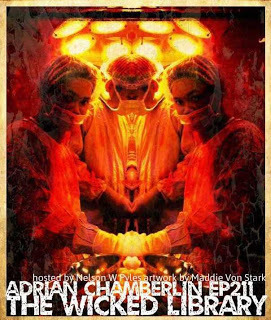
What do you think is the hardest aspect of the craft?
I am hoping one day I can live in a house in the woods and do nothing but make art and write books, solve mysteries, drink whiskey, drink beer and sit in front of the fireplace with my dog, Mr. Wu.
Current projects?
I am the resident artist for The Wicked Library.
I am in the final throes of edits on my first book in a trilogy, called "The Widow's Game, Another Amazing Adventure of Maddie Holliday Von Stark. I will have an actual press release sometime in July.
What do you think people expect from you with your art?
Well, I imagine that it is something they have never seen before?
Advice for aspiring artists or designers?
PUT IN THE WORK
BIO: Maddie Holliday Von Stark
Marshfield, Wisconsin
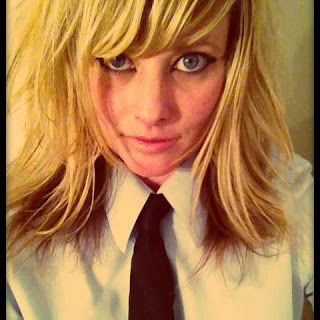 Someday you will read my story...
Someday you will read my story...I have the ashes of so many experiences on
my shoes.
The reaping and the wailing,
the surrender of troops
the sonic booms!
Hung heads,
and praying hands.
I
find myself shivering
In the shower shine
of hospitals,
and remake rooms.
Wondering when and what will break me?
and what will they make me,
into?
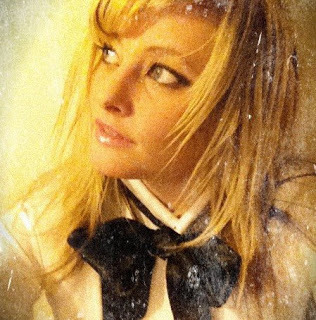 I am a girl on fire.
I am a girl on fire.A blow torch kid.
A phoenix adult,
the "Hey Jupiter" wind.
I am Doc Holliday,
the northern Sun,
the black edge of the thunder
a misfit on the run
Published on June 02, 2013 20:53
May 26, 2013
THE MADHOUSE ACCEPTS [BALES]-- BUT ONLY FOR THE TRULY INSANE.
PATIENT: ERIN BALES
ILLNESS: WRITER
When did you start writing? Why did you pick the genre you write it?
I’ve written for as long as I can remember, but I started writing seriously only recently. In my mind, writing was always a fallback, something I imagined I would be good at if I ever tried. It was my secret ambition -- the one that I was afraid to try at because what if I failed? But I eventually realized that not trying to live my dream was basically the same as not having a dream at all, and that’s when I applied to the MFA program at Seton Hill.
As for my genre, I write speculative fiction because I love chasing the what-if. I like taking the real world and turning it on its ear to see what it looks like from a different perspective. I gravitate toward epic fantasy because I love big stories, massive tales that span continents, where the fate of the world (or at least the fate of those living in it) is at stake.
Also, magic is cool.
Where you get your ideas from? Do you journal at all?
I don’t journal. I’ve tried to, but never had much luck with it. I’m not sure where my ideas come from. Sometimes my story ideas start with a character or a scene. Other times they begin with a concept.
What’s a normal (writing) day like for you?
I’m slow to wake, so I like to write first thing in the morning, before my inner critic has a chance to pipe up. I get a cup of espresso, put a sign up on my door to warn the family, stick my ear buds in, and go to town. I’ve found giving myself a weekly goal is best, as that gives me a little leeway on any given day. At least it does until the end of the week.
Favorite author or book? Who are you currently reading?
I tend to get very attached to authors – some of the ones I’m particularly attached to are Brandon Sanderson, Tamora Pierce, George R.R. Martin, Sharon Shinn, Octavia Butler, Scott Westerfeld, Scott Lynch, and Stephen King. Favorite books are more difficult, especially since a lot of my favorites write series, and while some series titles can function well as standalones, my love of them has much to do with the series of which they are a part.
As for what I’m currently reading, I’m making my way through Angie Sage’s now complete Septimus Heap series. I’m on book six of seven, Darke. The world is a lot of fun and there is a wide range of great characters. The series reminds me of the first four Harry Potter books (the end of Goblet of Fire being the point when Rowling took the series from middle grade to YA.)
Do you prefer writing poetry or prose? Why one over the other?
I’m a prose girl. I’ve never spent enough time writing poetry to evolve past the terrible, adolescent-angst phase. Plus, I’m an epic fantasy writer, so I tend to think of stories and ideas on a fairly grand scale. I suppose I could try my hand at something like Beowulf. . .
Do you write in silence or with noise (TV, movies, music)?
I usually can’t write to anything with words, so I listen to instrumental music, soundtracks mostly. Sometimes I can revise to stuff with lyrics – when I do that, I tend to create playlists that reflect the mood of the scene I’m working on. I also have playlists for characters that I listen to in the shower. So many brilliant ideas come in the shower . . .
Do you have any weird habits when it comes to writing? Do you type or write longhand?
I type all of my prose, but most of my notes are handwritten. I do need my music, and I have a specific mug that I prefer to use. I think that’s about it.
Would you consider yourself a Plotter or a Pancer?
Neither. That is to say, I’m kind of a pancer, but I prefer a different term. George R. R. Martin discusses architects and gardeners. Architects plan out a structure completely before they start building; whereas gardeners plant seeds and see how they grow. Most of the time a gardener knows what they’re planting, so there is some planning involved, but the mystery is in how that seed will grow and what the plant will eventually look like. So I prefer gardener to pancer because I’m not so much flying by the seats of my pants as I am finding seeds, planting them, and tending them as they grow.
What do you think is the hardest aspect of the craft?
The discipline needed -- in particular, the discipline needed to get through to “The End.” The road to hell is paved with good intentions, and this includes unfinished manuscripts. Until a novel is finished that’s all it is, a good intention. A vague hope. An unlived dream.
Current projects?
My thesis novel, which is about a city-state that has lived in peace for many years. But when the heir to the throne dies in what seems like a horrible accident, the ripples spread out to every corner of the continent.
I’m still working on my elevator pitch, but that’s the basic idea. I know a lot of people can work on more than one project at a time, but I’ve never been very good at that. I have some other ideas, but they’re mostly just stacks of notes at this point.
How do you balance being an editor and being a writer?
This is still something I’m figuring out because I tend to get very focused on one project at a time. I try to start with writing and move on to editing, but if I’m feeling too divided, then I’ll try to get one out of the way before moving to the other. With writing, this usually means taking a day or two to finish a chapter. With editing, it’s finishing a pass on a manuscript. This isn’t ideal, but so far it’s the best I’ve got.
What do you think people expect from you with your writing?
Well, I don’t think anyone expects anything yet, but hopefully they will come to expect large and well-drawn worlds, lots of complicated and engaging characters, strong female protagonists, and fantastical elements (they seem to even sneak into my SF).
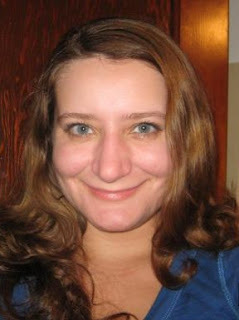
Advice for aspiring writers?
1) Read. If you don’t enjoy reading, then you’re probably barking up the wrong tree.
2) Write. Write as much as you can, as often as you can.
3) Finish what you start.
Bio: I write. I read. I edit professionally. I love snow and sad songs. My favorite color is red. If it wasn't totally weird, I might have a squirrel as a pet.
Here is a link to my much neglected blog: http://erinsbales.blogspot.com/
And I’m on Twitter @Bibliomaniacal1
ILLNESS: WRITER
When did you start writing? Why did you pick the genre you write it?
I’ve written for as long as I can remember, but I started writing seriously only recently. In my mind, writing was always a fallback, something I imagined I would be good at if I ever tried. It was my secret ambition -- the one that I was afraid to try at because what if I failed? But I eventually realized that not trying to live my dream was basically the same as not having a dream at all, and that’s when I applied to the MFA program at Seton Hill.
As for my genre, I write speculative fiction because I love chasing the what-if. I like taking the real world and turning it on its ear to see what it looks like from a different perspective. I gravitate toward epic fantasy because I love big stories, massive tales that span continents, where the fate of the world (or at least the fate of those living in it) is at stake.
Also, magic is cool.
Where you get your ideas from? Do you journal at all?
I don’t journal. I’ve tried to, but never had much luck with it. I’m not sure where my ideas come from. Sometimes my story ideas start with a character or a scene. Other times they begin with a concept.
What’s a normal (writing) day like for you?
I’m slow to wake, so I like to write first thing in the morning, before my inner critic has a chance to pipe up. I get a cup of espresso, put a sign up on my door to warn the family, stick my ear buds in, and go to town. I’ve found giving myself a weekly goal is best, as that gives me a little leeway on any given day. At least it does until the end of the week.
Favorite author or book? Who are you currently reading?
I tend to get very attached to authors – some of the ones I’m particularly attached to are Brandon Sanderson, Tamora Pierce, George R.R. Martin, Sharon Shinn, Octavia Butler, Scott Westerfeld, Scott Lynch, and Stephen King. Favorite books are more difficult, especially since a lot of my favorites write series, and while some series titles can function well as standalones, my love of them has much to do with the series of which they are a part.
As for what I’m currently reading, I’m making my way through Angie Sage’s now complete Septimus Heap series. I’m on book six of seven, Darke. The world is a lot of fun and there is a wide range of great characters. The series reminds me of the first four Harry Potter books (the end of Goblet of Fire being the point when Rowling took the series from middle grade to YA.)
Do you prefer writing poetry or prose? Why one over the other?
I’m a prose girl. I’ve never spent enough time writing poetry to evolve past the terrible, adolescent-angst phase. Plus, I’m an epic fantasy writer, so I tend to think of stories and ideas on a fairly grand scale. I suppose I could try my hand at something like Beowulf. . .
Do you write in silence or with noise (TV, movies, music)?
I usually can’t write to anything with words, so I listen to instrumental music, soundtracks mostly. Sometimes I can revise to stuff with lyrics – when I do that, I tend to create playlists that reflect the mood of the scene I’m working on. I also have playlists for characters that I listen to in the shower. So many brilliant ideas come in the shower . . .
Do you have any weird habits when it comes to writing? Do you type or write longhand?
I type all of my prose, but most of my notes are handwritten. I do need my music, and I have a specific mug that I prefer to use. I think that’s about it.
Would you consider yourself a Plotter or a Pancer?
Neither. That is to say, I’m kind of a pancer, but I prefer a different term. George R. R. Martin discusses architects and gardeners. Architects plan out a structure completely before they start building; whereas gardeners plant seeds and see how they grow. Most of the time a gardener knows what they’re planting, so there is some planning involved, but the mystery is in how that seed will grow and what the plant will eventually look like. So I prefer gardener to pancer because I’m not so much flying by the seats of my pants as I am finding seeds, planting them, and tending them as they grow.
What do you think is the hardest aspect of the craft?
The discipline needed -- in particular, the discipline needed to get through to “The End.” The road to hell is paved with good intentions, and this includes unfinished manuscripts. Until a novel is finished that’s all it is, a good intention. A vague hope. An unlived dream.
Current projects?
My thesis novel, which is about a city-state that has lived in peace for many years. But when the heir to the throne dies in what seems like a horrible accident, the ripples spread out to every corner of the continent.
I’m still working on my elevator pitch, but that’s the basic idea. I know a lot of people can work on more than one project at a time, but I’ve never been very good at that. I have some other ideas, but they’re mostly just stacks of notes at this point.
How do you balance being an editor and being a writer?
This is still something I’m figuring out because I tend to get very focused on one project at a time. I try to start with writing and move on to editing, but if I’m feeling too divided, then I’ll try to get one out of the way before moving to the other. With writing, this usually means taking a day or two to finish a chapter. With editing, it’s finishing a pass on a manuscript. This isn’t ideal, but so far it’s the best I’ve got.
What do you think people expect from you with your writing?
Well, I don’t think anyone expects anything yet, but hopefully they will come to expect large and well-drawn worlds, lots of complicated and engaging characters, strong female protagonists, and fantastical elements (they seem to even sneak into my SF).

Advice for aspiring writers?
1) Read. If you don’t enjoy reading, then you’re probably barking up the wrong tree.
2) Write. Write as much as you can, as often as you can.
3) Finish what you start.
Bio: I write. I read. I edit professionally. I love snow and sad songs. My favorite color is red. If it wasn't totally weird, I might have a squirrel as a pet.
Here is a link to my much neglected blog: http://erinsbales.blogspot.com/
And I’m on Twitter @Bibliomaniacal1
Published on May 26, 2013 22:12
May 20, 2013
MADHOUSE PATIENT RIPPED APART BY OBSESSION
PATIENT: CARLA ANDERTONILLNESS: RIPPER-LIKE TENDACIES How do I sleep at night? Not well… More often than not, when I tell people – particularly my community college students – that I’m an expert on Jack the Ripper, I get at least a handful of strange, bemused looks. I’m never surprised by it. Despite the fact that Jack the Ripper is perhaps the most infamous serial killer of all time, the study of his crimes has a name – Ripperology – and has spawned an entire industry devoted to discovering “whodunnit,” it remains an unusual and admittedly morbid period of history with which to be engrossed. And I am that, thoroughly engrossed. Since my earliest encounter with the spectre of the Ripper on a “Jack the Ripper Walking Tour” in 1995, I’ve been fascinated by the man and the myth. I’ve read perhaps every reputable book on the subject, and a few that were less than credible. I’ve heard all the pet theories, ranging from the believable to the absurd, as to the identify of the elusive killer we call “Jack the Ripper,” “Leather Apron,” “The Fiend of Whitechapel,” etc. The list of monikers is almost as long as the list of suspects. I’ve studied the autopsy and crime scene photos from every angle. Wake me up from a dead sleep and ask me to recite the names and nicknames of the five canonical victims and I can do so without hesitation. Every year, on the anniversaries of their deaths, I pause to honor their memories, whether with a moment of silence or a Facebook posting commemorating the same. As previously stated, I am far from alone in my interest in all things Ripper and yet it never perplexes why I get bewildered looks when I tell others of my love for my main man, Jack. There’s an old adage that appearances can be deceiving, and I’m certain my own appearance is misleading. Diminutive in stature, I’m not particularly menacing, nor do I necessarily convey much of an aura of authority as it pertains to a century plus old crime. Unlike many students of serial murderers, I don’t dress the part, since with two grey and white cats I’ve (mostly) banned dark colors from my wardrobe. I wear glasses, but I’ve never thought they made me look studious or like someone who’s spent whole days poring over the case files. And, yet, in spite of my deceptive exterior, inside my mind I fear I retain too much tragedy. Inside my head are statistics so horrifying it actually alarms me how easily and unemotionally I can rattle them off. From the number of stab wounds sustained by the first –albeit non-canoncial victim–Martha Tabram, to the count of organs the Ripper removed from the body of the alleged last victim, Mary Jane Kelly, I can vividly picture each of Jack’s “Unfortunates” in situ. An early reviewer of my debut novel, The Heart Absent, a tale of Jack the Ripper in love, begged the question of how I manage to sleep with all these ghastly facts crowding my psyche and the answer is simply: Not well. Not well, at all. Still, I continue on as an amateur Ripperologist, and despite my concerns about overexposing myself to evil, I likely will remain fascinated by the Whitechapel Fiend until the end of my days. With the advent of advanced technology and automatic communication, new theories are constantly being put forward, some based in (pseudo)science, others based on cold facts, and even those derived from a fleeting observation or emotion. All these theories provide opportunities for expansion, elaboration and reflection. Which brings me back to The Heart Absent, a fictional novel in which I tried not to answer the question “Who was the Jack the Ripper?” but rather “What sort of man could Jack the Ripper have been, and what sorts of events might trigger such chaotic violence?” Further, I sought to create complex characters, set against a realistic, meticulously researched historical backdrop, and to put those same characters in situations where my reader would be forced to alternately cheer and condemn them. Was I successful? Only my readers can respond to that and, if you like stories about heartbreak and horror, passion and loyalty–or even if you just like a good whodunnit or a complex romance–I think you’ll enjoy The Heart Absent. I welcome your comments here, via email at carla@jozart.com, or over on my web site at www.carlaeanderton.com. You can also add me on Facebook, Twitter, LinkedIn or Pinterest.
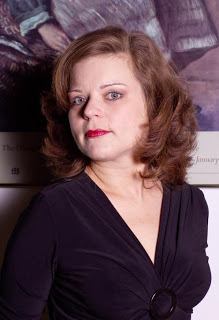 BIO: For as long as she can remember, Carla Elizabeth Anderton aspired to become a professional writer, a desire that’s been applauded and supported by her parents, her late grandparents, and nearly every English teacher who’s ever counted her as a student. A voracious reader from an early age, she’s fascinated by history and the human condition, and prefers to read/write fiction based on fact. Her pet subjects include European history, specifically England during the Tudor and Victorian eras. A recognized expert on the infamous serial murderer Jack the Ripper, she made the elusive killer the focus of her debut novel, The Heart Absent, which was published by New Libri Press in April 2013.
BIO: For as long as she can remember, Carla Elizabeth Anderton aspired to become a professional writer, a desire that’s been applauded and supported by her parents, her late grandparents, and nearly every English teacher who’s ever counted her as a student. A voracious reader from an early age, she’s fascinated by history and the human condition, and prefers to read/write fiction based on fact. Her pet subjects include European history, specifically England during the Tudor and Victorian eras. A recognized expert on the infamous serial murderer Jack the Ripper, she made the elusive killer the focus of her debut novel, The Heart Absent, which was published by New Libri Press in April 2013.
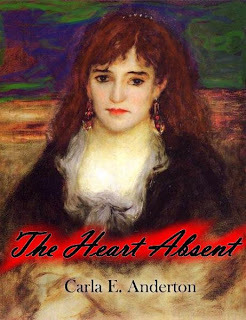 Anderton earned a Master of Fine Arts in Writing Popular Fiction from Seton Hill University and a Bachelor of Arts in English from California University of Pennsylvania.
Anderton earned a Master of Fine Arts in Writing Popular Fiction from Seton Hill University and a Bachelor of Arts in English from California University of Pennsylvania.
In addition to writing fiction, she has published poetry, essays, articles and plays and has an extensive background in small press journalism. For nearly five years, she was Editor-in-Chief of a regional monthly newsmagazine, California Focus, and since 1994 has edited/produced a literary arts magazine, Peer Amid, at varying intervals. Currently, Anderton is an adjunct professor of English. She also serves as President of the Board of Directors of the Jozart Center for the Arts in California, Pennsylvania where she lives with a tall, talkative computer repairman and her 15-year-old son. NOVEL SYNOPSIS: 14-year-old James Nemo spent most of his youth motherless and under the thumb of a father who hates him. These injustices he quickly forgets, however, in the arms of a beautiful young prostitute named Nelly. Reality conspires against the young lovers, and James is left, alone and angry, to confront the truth behind his mother’s abandonment. Twenty years pass. James, now a respected artist, meets Mary Jane Kelly, an Irish prostitute who bears more than a passing resemblance to Nelly. Convinced his redemption lies in her, James slowly ensnares her into his ever darkening world. His passion for her escalates to a frenzy, amidst the backdrop of Victorian London in the heyday of Jack the Ripper, and threatens to consume them both.
 BIO: For as long as she can remember, Carla Elizabeth Anderton aspired to become a professional writer, a desire that’s been applauded and supported by her parents, her late grandparents, and nearly every English teacher who’s ever counted her as a student. A voracious reader from an early age, she’s fascinated by history and the human condition, and prefers to read/write fiction based on fact. Her pet subjects include European history, specifically England during the Tudor and Victorian eras. A recognized expert on the infamous serial murderer Jack the Ripper, she made the elusive killer the focus of her debut novel, The Heart Absent, which was published by New Libri Press in April 2013.
BIO: For as long as she can remember, Carla Elizabeth Anderton aspired to become a professional writer, a desire that’s been applauded and supported by her parents, her late grandparents, and nearly every English teacher who’s ever counted her as a student. A voracious reader from an early age, she’s fascinated by history and the human condition, and prefers to read/write fiction based on fact. Her pet subjects include European history, specifically England during the Tudor and Victorian eras. A recognized expert on the infamous serial murderer Jack the Ripper, she made the elusive killer the focus of her debut novel, The Heart Absent, which was published by New Libri Press in April 2013.
 Anderton earned a Master of Fine Arts in Writing Popular Fiction from Seton Hill University and a Bachelor of Arts in English from California University of Pennsylvania.
Anderton earned a Master of Fine Arts in Writing Popular Fiction from Seton Hill University and a Bachelor of Arts in English from California University of Pennsylvania.In addition to writing fiction, she has published poetry, essays, articles and plays and has an extensive background in small press journalism. For nearly five years, she was Editor-in-Chief of a regional monthly newsmagazine, California Focus, and since 1994 has edited/produced a literary arts magazine, Peer Amid, at varying intervals. Currently, Anderton is an adjunct professor of English. She also serves as President of the Board of Directors of the Jozart Center for the Arts in California, Pennsylvania where she lives with a tall, talkative computer repairman and her 15-year-old son. NOVEL SYNOPSIS: 14-year-old James Nemo spent most of his youth motherless and under the thumb of a father who hates him. These injustices he quickly forgets, however, in the arms of a beautiful young prostitute named Nelly. Reality conspires against the young lovers, and James is left, alone and angry, to confront the truth behind his mother’s abandonment. Twenty years pass. James, now a respected artist, meets Mary Jane Kelly, an Irish prostitute who bears more than a passing resemblance to Nelly. Convinced his redemption lies in her, James slowly ensnares her into his ever darkening world. His passion for her escalates to a frenzy, amidst the backdrop of Victorian London in the heyday of Jack the Ripper, and threatens to consume them both.
Published on May 20, 2013 20:36
May 13, 2013
MADHOUSE LEADS PATIENT IN WRIGHT DIRECTION
PATIENT: K. CERES WRIGHT
ILLNESS: WRITER
When did you start writing? Why did you pick the genre you write in?
I always received good grades in English in school, but it wasn't my favorite subject. Math was my favorite. But I was working as a credit analyst for an insurance company in the mid-nineties, and the company had been hemorrhaging money for a few years and decided to lay off people. So in order to relieve some of the stress I was undergoing, I began writing. I wrote a science fiction story about my coworkers and they thought it was hilarious. So I sent it to some publishers, and it was quickly rejected. One editor wrote, "Character development?" on the first page, so I assumed that meant something. In school, I never really was taught how to write a story, only how to analyze one...metaphors, allegories, themes, and the like. But I discovered that I liked writing stories, so I kept at it.
I had become hooked on reading science fiction since about the fourth grade, when I first read, The Wonderful Flight to the Mushroom Planet. I eventually graduated to Isaac Asimov, Ray Bradbury, and Arthur C. Clarke. But as I got older, my reading trailed off into mysteries, spy stories, and nonfiction. Then one day at work, in 2004, I picked up a book called Neuromancer. I was enthralled. So I read more cyberpunk and decided to write a cyberpunk story. Then I wanted to write a book, but I didn't know how. I researched various writing programs and discovered Seton Hill University's (SHU) Writing Popular Fiction Program.
Where do you get your ideas from? Do you journal at all?
My ideas come from current advances in science that I project out about 50 years or so. Or at least I try. I guess we'll see how close I got in 2063.
No, I don't journal.
What's a normal (writing) day like for you?
I'm not a morning person, so I sleep until the last possible moment....and sometimes more. I don't think I have a normal writing day. If I'm sitting, waiting somewhere, like at the mall, I'll pull out a piece of paper and write. Or if after I come home from work, make dinner, and have enough energy, I'll write. Research is important, so I may do that on my lunch hour, or at night, as well. It's hard when I'm just starting a book because I'm not in the groove, so to speak. But once I'm there, it's usually at night when I write.
Favorite author or book? Who are you currently reading?
My favorite author is Richard K. Morgan. But I'm currently reading Cyberpunk: Stories of Hardware, Software, Wetware, Evolution, and Revolution by various science fiction authors; and Hellbender by Jason Jack Miller. It's hard for me, as I'm an editor at work so I read all day, and I don't feel like reading when I get home. So I keep books on both my nightstand and in the bathroom, so I can take advantage of whatever free time I may have.
Do you prefer writing poetry or pose? Why one over the other?
I prefer to write prose. My father's a poet, and while growing up, I had a hard time understanding what he meant in his poems. I decided that one should mean what one says, and say what one means. None of this 'it's how you interpret it' type of thing I've softened somewhat over the years, and I have written a poem that was nominated for a Rhysling award, but I much prefer prose.
Do you write in silence or with noise?
I mostly write in silence. If I'm at the mall or somewhere there's background noise, I can filter that out, being a mom, but if I'm at home, I write in silence.
Do you have any weird habits when it comes to writing? Do you type or write longhand?
I used to write longhand, but decided it would be quicker to learn how to write while typing, so I taught myself that.
Would you consider yourself a Plotter or a Pancer?
I have to outline a story, or I'll wind up far from where I had intended to go, but after that, I'm definitely a pancer. Sometimes ideas just flow as soon as I put my fingers to the keys. Other times, I have to sit and think, or take a walk, or sleep on it.
What do you think is the hardest aspect of the craft?
For me, it's the non-writing aspects--marketing, posting updates, speaking in front of people, and the like. I'm an introvert, so being asked to give a talk, or do an interview is quite a challenge for me. But I recently agreed to do media pitching at work for practice so hopefully it'll help.
Current projects?
I'm working on a book with Rachael Pruitt, a fellow SHUer, who writes Arthurian fiction. She wrote The Dragon's Harp, which is about the life of Gwenhwyfar. Our book will be post-apocalyptic, so I think it will be able to highlight both of our talents, telling stories about groups of people who still have access to technology, and those who don't.
How do you balance being a writer?
For me, there's never a constant balance. If something or someone (read: children) requires my attention, it's all there. Writing takes a backseat, at least the focus. I'm always thinking of plots or characters in the back of my mind, just not writing it down. Or I'll file something away for later use. But if everything is going pretty smoothly, then I can sit and get it all down.
What do you think people expect from you with your writing?
I love action, so my readers, I think, will definitely get a fast ride. I try to put a cliffhanger at the end of each chapter to get them to stay up until 3 a.m. to finish my book.
Advice for aspiring writers?
Persevere. We all get rejected but we have to keep putting our work out there.
Keep learning. You never get to the point where you can't learn anything more about the craft, especially grammar. As an editor, I can't stress that enough. If your work is punctuated (see what I did there?) with errors, the story may be great, but an editor will toss it.
Read or listen to interviews given by your favorite authors. They've been where you are.
PUBLICATIONS:
Cog. (July 2013). Dog Star Books."Choices" in Hazard Yet Forward (2012)."Cyberpunk: Remastered" in Many Genres, One Craft (2011). Headline Books."The Haunting of M117" in Genesis: An Anthology of Black Science Fiction (2011)."Doomed" in 2008 Rhysling Anthology. (2008) Science Fiction Poetry Association.
BIO: Daughter to a U.S. Army father, K. Ceres Wright has lived in Anchorage, AK; Chicago, IL; Baltimore, MD; Frankfurt, Oberursel, and Munich Germany; Seoul, Korea; and the Washington and Metropolitan Area. She attended undergraduate school at the University of Maryland, College Park, with a double major in economics and finance, then worked for 10 years as a credit and treasury analyst before deciding to change careers.
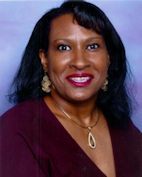 Wright received her master's degree in Writing Popular Fiction from Seton Hill University in Greensburg, PA, and Cog was her thesis novel for the program. An accomplished poet, Wright's science fiction poem "Doomed" was a nominee for the Rhysling Award, the Science Fiction Poetry Association's highest honor. Her work has appeared in Hazard Yet Forward; Genesis: An Anthology of Black Science Fiction; Many Genres, One Craft; and The 2008 Rhysling Anthology.
Wright received her master's degree in Writing Popular Fiction from Seton Hill University in Greensburg, PA, and Cog was her thesis novel for the program. An accomplished poet, Wright's science fiction poem "Doomed" was a nominee for the Rhysling Award, the Science Fiction Poetry Association's highest honor. Her work has appeared in Hazard Yet Forward; Genesis: An Anthology of Black Science Fiction; Many Genres, One Craft; and The 2008 Rhysling Anthology. She currently works as an editor/writer for a management consulting firm and lives in Crofton, MD with her son, Ian, and daughter, Chloe. Visit her website at http://www.kcereswright.com and find her on Twitter @KCeresWright.
Published on May 13, 2013 17:54
May 9, 2013
WYTOVICH WORD-SICK AND MAD
PATIENT: Stephanie M. Wytovich
ILLNESS: Poet
SYMPTIOMS: Insomnia, possession, hallucinations, hysteria
STATUS: Insane, dangerous and delightfully mad
NOTES:
I didn't pick poetry.
Poetry picked me.
Ever since I was little, if I didn't write for a few days, I'd start to feel this ache in my chest that told me I was depressing my creativity. Lately, I've been doing nothing but working on my novel, yet that ache has been eating at me for the past couple of hours. I've come to recognize this feeling and got to know it very well, for now I only get it when a poem is inside of me, and I'm ignoring its words. So as a slave to the pain, I bring tonight's musings to the MADHOUSE, because after all, it is madness that drives me to the page night after night.
Stay Scared,
Stephanie M. Wytovich
EVIDENCE: "Phantom Beat"
I gave my heart away, Signed away the rights and Yet I can still feel the phantom beat In my chest, Reminding me that I used to be whole, And that at one point I wasn’t so empty
TREATMENT: Beyond help
Published on May 09, 2013 18:54

